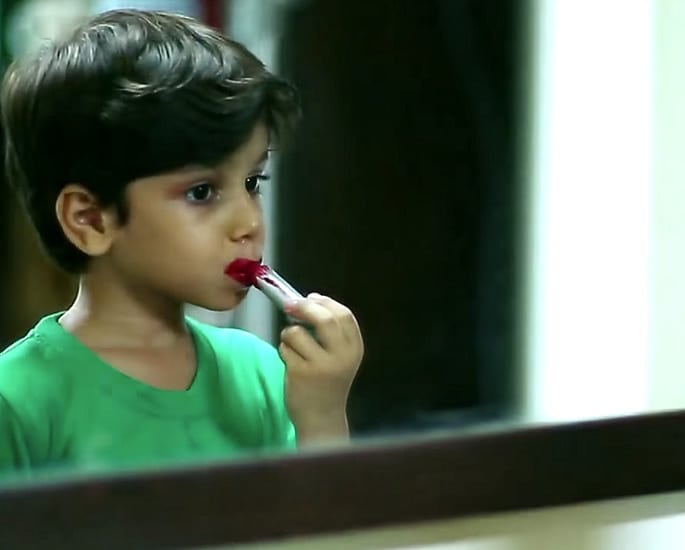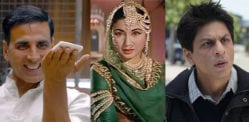This drama educates the audience about sexual abuse and mental harassment
If you enjoy authentic, non-dramatic and real stories then Pakistani dramas are the one.
With no close-up shots being replayed again and again or over dramatisation of scenes, Pakistani dramas keep you intact and on edge with raw performances which make you feel like your in the scene.
Television dramas made in Pakistan have come a long way to reach an audience which reaches beyond international countries.
The television industry has a wide range of genres but does particularly well with its audience through topics which often are known as a social stigma.
Topics such as child abuse, marital rape, and honour killing are still considered as sensitive subjects and relate to being a stigma.
Pakistani dramas are followed not only in Pakistan but they have a tremendous reach globally. They are popular with South Asian viewers internationally.
The duration of Pakistani dramas are often shorter and get straight to the point. Most dramas last on television for less than a year and each episode is around 30-40 minutes.
We take a look at Pakistani dramas which tackle social stigma very well.
Chup Raho
The title of this drama Chup Raho which means ‘Be Quiet’ is often the word used in many cultures and countries where talking about abuse/molested is taboo.
In order for the family name and honour to be intact, a girl is told, Chup Raho.
This drama unfolds the story of a young girl Rameen who is raped and molested by her brother-in-law, though her mother is aware, to keep the honour of elder daughter’s marriage and families honour she asks Rameen to be quiet.
The story continues shows her journey of getting married into the same family as her elder sister who is blinded by her ‘ideal’ husband, to be further abused by her paedophilic brother-in-law.
The story unfolds the journey of Rameen and her struggle to escape and find peace within herself.
The actors are convincingly good and make you want to cry with them when they cry and feel love when love blossoms between Rameen and her husband.
Rameen is played by actor Sajal Ali, followed by her on-screen husband Feroze Khan, Syed Jibran (brother-in-law) and Arjumand Raheem who plays the elder sister.
Chup Raho dives into a deep matter which is still very common in rural areas where it is believed that for the victim especially, if she is a girl, then she should be quiet because it can bring shame to the family and could possibly make the girl ‘unsuitable’ for someone else.
Baaghi
Baaghi was an awaited drama which was loved by the audience, grabbing millions of views within the first week of its release.
The drama is based on the real-life story of a controversial public figure, Qandeel Baloch. She was heartlessly murdered by her younger brother in the name of honour.
Character names were changed for television purpose. Qandeel Baloch was named Kanwal Baloch for the drama, whose real name is Fouzia Azeem but changed to Fauzia Batool.
The story shows the life of a fun, outspoken young girl who has dreams of going to the big city and becoming a model and famous.
She gets married to the love of her life at a very young age and has a son. Although telling her husband prior to marriage about her dreams and ambitions he asks her to stay home and look after her son.
After many arguments and abuse Fauzia finds out that her husband is cheating on her and confronts him. Her husband Abid divorces her and takes her son away from her.
After Fauzia receives an unexpected call from a modelling agency, she decides to flee from her village in order to gain custody of her son and become famous.
Things do not go so smoothly for Fauzia and she decides to change things around her way and becomes a social media celebrity, Kanwal Baloch.
The journey of Kanwal starts and shows the road to gain fame and become famous. It also shows her rock bottom moments where the audience is left to feel nothing but remorse and sadness.
In one scene Kanwal is forced to sleep with the Inspector as the last resort. Her younger brother was arrested for gambling. Moments like this make the audience hairs stand up.
The cast is played by the finest Pakistani actors, Saba Qamar as Kanwal Baloch, Ali Kazmi as Kanwals ex-husband and Osman Khalid Butt who plays the love interest.
This drama brings matters such as honour killing to the public eye. It shows the untold side of the heartless brother and his sick mentality which forced him to commit such an act.
This drama is an eye opener to the public which will allow people to understand the struggles one has to go through in order to make ends meet.
Udaari
Udaari is a gut-wrenching drama which bought real-life deep-rooted topics such as paedophilia child rape and taking up music as a career in mainstream media.
The drama tells the story of two families who live next to each other.
One side of the drama shows the journey of a widowed wife and single mother t0 10-year-old daughter Zebo who is raped.
The other aspect of the story shows the hurdles of a young girl who is trying to make a career in singing for herself.
This drama got wide recognition within Pakistan and internationally as it talks about real life topics which are till date unspoken of because they have a stigma attached to it.
Child molestation and rape are topics which are still pressed under as they are thought of as shameful for the girl.
A similar incident took place with a 6-year-old girl Zainab Ansari. She was kidnapped and brutally raped to be found in a dumpster in Kasur, Pakistan.
Lead actor of Udaari, Ahsan Khan told the BBC, the importance of Pakistani dramas covering subjects which are taboo, saying:
“To make a statement, you have to touch such subjects which people do not want to talk about.”
Khan said that if you take a “certain taboo subject” it is imperative “to make a drama or a film on that.”
Khuda Mera Bhi Hai
Khuda Mera Bhi Hai is a drama written by Asma Nabeel and directed by Shahid Shafaat. This drama talks about one of the most taboo topics in society, intersex children known as ‘khusras’.
The story tells the path of a mother, ‘Mahgul’ who is played by Ayesha Khan, who is married to ‘Zain’, played by Syed Jibran and their intersex child ‘Noor’, Furqan Qureshi.
Zain and his mother are unable to accept Noor and Mahgul, which leaves the mother and child to lead their own life alone. Mahgul is a strong and independent woman who will do whatever it takes to do the best for her child.
Their path is heartbreaking and painful but the actors do justice to their role whilst portraying this taboo topic which is often frowned upon and bringing it into the light to be spoken about.
This drama was perceived very well by its audience and left the impact it intends.
The goal was to make people realise that children should not be treated any differently or looked down on because of their gender, everyone is equal.
This drama brings social awareness of intersex children and the stigmas attached to a child.
It explores both the difficult side as well as showing how to overcome this stigma, highlighting all children are the same and they should not be treated differently.
Yaqeen Ka Safar
This drama is based on a novel written by Farhat Ishtiaq called Woh Yaqeen Ka Naya Safar.
The two leading characters Dr Zubia Khalil played by Sajal Ali and Dr Asfandyar Ali Khan played by Ahad Raza Mir unravel their potential romance after a very difficult and long journey as doctors facing similar challenges.
The second set of characters are Daniyal Ali Khan a barrister who educated in London and the brother of Asfandyar, played by Shaz Khan, and Gaiti Daniyal Ali Khan played by Hira Salman, who is Daniyal’s cousin and is going to marry him, through an arranged marriage.
A third strand is that of Noori (Suhaee Abro), a girl from a rural village in Sindh, who gets kidnapped
These relationships are a backdrop to the drama highlighting a number of social stigma issues affecting Pakistani society especially, violence against women.
It starts with Daniyal returning from London to Pakistan to work as a lawyer in a corrupt society. He tries to seek justice for Noori who is gang-raped the son of Jehangir Shah, who is a fraudulent minister.
But Daniyal is murder by Shah’s men. This is the turning point for the drama. When the families leave Islamabad and go back to Northern Pakistan, which is when many social issues are tackled by the drama.
Gang rape, slut-shaming, domestic abuse, internalised misogyny are strongly depicted in some of the drama’s storylines.
Dar Si Jati Hai Sila
Dar Si Jati Hai Sila is an eye-opening drama which hit all the right notes from episode one. The drama is written by Bee Gul and directed by Kashif Nisar.
This drama educates the audience about sexual abuse and mental harassment caused by loved ones/family members.
Sila, who is played by Yumna Zaidi is abused by Joi Mama (Noman Ijaz).
Joi Mama creeps up on Sila in the middle of the night and starts stroking her face. Sila wakes up in a fright screaming and shouting for her mother, (played by Saman Ansari). The look given by her mother shows that his actions are not something she is unaware of.
Silas father has lived abroad for most of Silas childhood and her mother has raised her. Silas mother Sadia has a son, Hatim, whose father is Joi Mama.
The story unravels the journey of a delicate girl who is frightened and timid as some of the close people who are believed to be ‘family’ are monsters living under a mask of decency.
Dar Si Jati Hai Sila is a true story of many innocent young girls who are mistreated and took advantage of by their own family members.
Sammi
Sammi is a Pakistani drama is written by Noor-ul-Huda Shah and is directed by Saife Hassan. It highlights the social stigma related to women who are sold-off as a wani (also known as vani).
A woman becomes a wani as part of a custom whereby she is given as a bride forcibly as a punishment for the crimes committed by her male family members.
Sammi Jutt played by Mawra Hocane is engaged to Parvez, a friend of her brother, Waqaz.
However, he is killed by Waqas due to a dispute related to ‘Haq Mahr’, which is a mandatory payment, paid by the groom to the bride in the form of money or possessions.
In order to save the son of the family, Sammi’s parents sell her off as wani to Parvez’s father, Fazaluddin. But then she is made a wani second time to Rab Nawaz’s son, Shahzeb.
With the help of Shahzeb’s mother, Nazo, who is unhappy about the arrangement and Rab’s half-brother, Rashid (Adnan Siddiqui), Sammi’s escape is organised.
Sammi goes to live with Chandi (Saania Saeed). Chandi’s son Salar wants to marry Sammi, but she is not willing. Due to this, she is thrown out of the house by Chandi.
Waqas searches for Sammi for staining the family honour and is made aware of her whereabouts by Chandi.
He finds her and takes her back to their village, where he tries to burn her in front of everyone. But Rab Nawaz intervenes and takes her back to his haveli.
Waqas is handed over to the police and Sammi survives the torment when Chandi marries her off Aaliyan (Bilal Khan) but it is her last deed before she passes away.
The drama highlights how traditional customs like wani are still followed strongly in the tribal areas of Pakistan.
There are other Pakistani dramas as well which are worth watching covering social stigma. These include Roag, Dil Tu Bhatkay Ga, Muqabil, Ghayal, Illteja, Besharam, Gul-e-Rana and Daldal.
All of the Pakistani dramas mentioned above convey a social message of topics which are predominantly considered as a stigma. Pakistani dramas are doing very well to create awareness of real-life topics which affect mothers, wives, and daughters.
As these topics are still a problem for many rural areas of South Asia and beyond, Pakistani dramas are creating a new wave of spectrum for people to open up and tell their truths and stories.




































































